- Home
- William Goldman
The Temple of Gold
The Temple of Gold Read online
The Temple of Gold
William Goldman
for Marion
CONTENTS
FOREWORD
THE FAMILY
THE BOYS
THE GIRLS
THE COLLEGE
THE ARMY
THE TOWN
THE WIFE
THE END
AFTERWORD
A Biography of William Goldman
Foreword
THE FIRST TIME I ever had a catatonic fit was also the first time I ever sold a piece of writing. The two events are more than a little related and I think to try and understand my onetime catatonia, you have to know what corner of the room I was coming from.
I was born in Chicago, 1931, and brought up in a then small commuter’s town, Highland Park. The 8:08 was the morning train of choice; the 5:40 p.m. brought the fathers home.
Mine was a businessman’s family. There were two children, my four-years-older brother, James, and myself. He went on to win an Oscar for writing The Lion in Winter, but in his teens he wanted to be a music critic.
I had always wanted to be a writer, I don’t know why. Probably because from my earliest memories, I have loved stories. I hid in books my first twenty years. I remember once picking up a play by O’Neill we had on our bookshelves, Ah, Wilderness—I hated it so much I could not believe he was this genius playwright, so I went to the library and over that weekend read everything he had ever written. Not such a big deal as I think back on it now. Except I was probably thirteen when I did it. So clearly, I read.
But my great love was comic books. I had many hundreds of them, all from what is now the golden age. My father was somehow on the mailing list for Walt Disney’s Comics and Stories. He brought that home. And I would go to Larson’s on Central with my allowance money for such wonders. The first Superman. Not just the first Batman but also the first Batman and Robin. Captain Marvel—and yes, I still know what SHAZAM stands for—the Sub-Mariner, on and on.
If you are wondering what my collection is worth I will tell you: zip. Because my mother, in an act of mother’s evil bordering on Medea’s, my mother, without asking or telling me, without so much as a word, gave my entire collection away. To the soldiers at Fort Sheridan.
I don’t remember writing during these early years. Maybe I tried a one-page something or other when I was twelve or in my midteens. Doubt it, though. I just had this vague notion that being a writer would be neat, whatever that meant.
Then Irwin Shaw came along to save me.
I was eighteen and an aunt gave me a copy of Mixed Company, a book of his collected stories. I’d never read a word by him, never probably heard his name. But I remember the lead story in the book was “The Girls in Their Summer Dresses.” About a guy who looked at women. It was followed by “The Eighty-Yard Run.”
Now you probably read this about me when all the millennium madness was going on—so and so was the greatest this, such and such was the greatest that—so you must have seen the headlines proclaiming me “Sports Nut of the Century.” In truth, the balloting wasn’t even close.
Point being? The New Yorker, by this time, had begun its endless publishing of bloodless stories about, say, an American couple, unhappily married, and they go to Europe maybe to change things and they end up at the Piazza San Marco where in the last paragraph a fly would walk across the table, and the story would always end like this: “And she understood.” Well, “The Eighty-Yard Run” is about a football player. Shit, I remember thinking, can you do that? Can you write about stuff I care about?
I finished Mixed Company and probably didn’t know the effect it would have on me. You see, Shaw wrote so easily. Never the wrong word. You just go happily along mostly unaware of the miracles happening around you.
Shaw is out of fashion today, which is too bad for you, because he is one of the great story writers in our history, and more than likely, you don’t know that. He and F. Scott Fitzgerald are my two guys, and I have zero doubts on that score.
So I decided I would write like Irwin Shaw. (Easy money at the brick factory.) At eighteen, I began writing stories. Not a whole lot of instant acclaim. I took a creative writing course at Oberlin. Everyone else took it because it was a gut course. I wanted a career. Everyone else got As and Bs, I got the only C. It goes downhill from there.
I took a creative writing course at Northwestern one summer. Worst grade in the class. Oberlin had a literary magazine and I was the fiction editor. Two brilliant girls were involved with me. One was the poetry editor, one the overall chief. Everything was submitted anonymously. Every issue I would stick a story of mine in the pile. And wait for their comments.
“Well, we can’t publish this shit,” they would say when my story came up for discussion. Do you understand? I couldn’t get a story of mine in a magazine when I was the fiction editor.
I go into the Army after graduation, am sent to the Pentagon by mistake. Every evening I would go back to Fort Myers for dinner, then return to the Pentagon to write my stories.
And of course, send them out.
I have, somewhere, hundreds of rejection slips. Never a comment from an editor. Never anything but the form note saying what I had written was not of interest at this time.
My confidence is not building through these years. I hope you get that.
Graduate school, Columbia. 1954–1956. My college grades are so bad I can’t get accepted without pull, which luckily I had.
I kept sending out my stories. Kept getting the hated rejections. The suggestion is made I might return to Chicago after I got my master’s and go into advertising. If I wanted to write, well, I could be a copywriter.
June ’56, and the end is near. I am done with college, done with the Army, done with grad school. I thought for a moment of getting a doctorate, but then I realized I would have to pass a number of language tests and I have no facility for languages. The ad agency was smiling at me malevolently.
Where do you go when there’s no place to go? Home. So I went back to Highland Park where Minnie was. Tomine Barstad came to work for my family five years before I was born, left when I was in my forties, and more than anyone is the reason I’m alive today. I would write and she would cook meals and sometimes I would take a break and we would have coffee in the kitchen. I had never written anything much longer than fifteen pages, but pretty soon I was on page 50 and that was scary because I’d never been there before. Then page 75 and finally, three weeks after I started, on July 14, page 187, and The Temple of Gold was finished.
I named it after the ending scene from Gunga Din, now and forever the greatest movie, where Sam Jaffe climbs up the temple of gold and saves the British troops and gets shot to death for it.
I held a novel in my hands. What a thing.
Query: what to do with it?
Cutting to the chase: a guy I knew in the Army knew an editor who hated dealing with agents so he became an agent so he could deal with writers. Joseph McCrindle. He read it, sent it to an editor he knew at Knopf. Who read it.
Now you are thinking the editor did one of two things—accepted it or turned it down.
Nope. He was kind of intrigued by what he’d read but he had no idea if I could write or not. So what he said was this: double it in length and submit it again.
That still seems among the nuttier directives ever given to a would-be first novelist. But after the standard days of panic, I did it. Submitted it again. And waited.
I was living in an apartment then with two others from the Midwest, my brother, who had now decided to become a playwright, and his oldest friend, John Kander from Kansas City, who wanted to be a Broadway composer someday but at that moment was stuck giving voice lessons. (Not forever, though. He went on to write Cabaret
, Chicago, New York, New York, etc., etc.)
We had this sensational apartment. 344 West 72nd Street. Nine rooms, and the front three had what is still, for me, the view of Manhattan—straight up the Hudson to forever. People now who are told the three of us, all young and feisty, were together trying to crack Magic Town find the thought romantic. I never felt it was anything but three nerds trying to get through the day.
The rent was a total of 275 smackers. If you think that is amazing, know this: it had been on the market for six months at the gaudy number 300 and no one would take it. The rumor we were told was that the previous tenants were six Juilliard piano students who went mad one night and had a piano-playing contest, all six banging away at the same time for hours till the management got them out. (Van Cliburn was reputed to be one of the six, but I never checked that for fear that it might not turn out to be true. In my mind, he absolutely was.)
So one day, I am alone in the apartment, pacing, waiting to hear, hoping that somehow this time my novel might actually be accepted. But no one, truly, truly, had any faith. (A girl I was dating, when I picked her up later that night, gave me a present. When I asked what it was for she said it was something nice considering the publisher had rejected me.) But the phone rang—and it must have, but from now on I remember almost nothing—it was my agent saying that Knopf said yes.
I must have sounded pleased, but as I said, who knows? Jim was up in Boston and John was out somewhere, so I just wandered around the place.
When Kander came home he said, “Have you heard?” and I must have told him they took it and he said—probably—“Oh, Billy, that’s wonderful.” And I must have allowed that sure it was.
Then he asked, was everybody excited that I’d told? Hadn’t told anybody, I answered.
By now he realized I was acting very weirdly indeed, so he saved me with these words: “Billy, would you like me to call people for you?”
How would we work that? I must have wondered.
“Well,” Kander said, carefully, “what we could do is sit next to the phone and you could tell me who you wanted me to call and then I could call them and tell them the news and also that you were acting a little strange and didn’t want to talk about it now.”
I liked the sound of that so we did it. I remember sitting down next to him and he would say, “I think Sarah would be so happy for you, shall we call Sarah?” and I would nod and I can still hear him saying, “Sarah, Billy’s book was taken by Knopf but he’s not quite up to talking about it, would you like to say congratulations?” and then he would put the phone near me and Sarah would say, “It’s just wonderful,” and I would say “Thank you, it is,” and then John would tell her that I would call tomorrow and we went on down the line of all the people I knew.
I didn’t know at the time that I was in a catatonic state, maybe a medico would say it was something else. But looking back on it, I’m satisfied that’s what it was.
By the next day I was able to deal with the phone myself and life went on. But of course, it had changed. Everything had changed. I was a writer now.
Later that week I went to a party and met a girl and she asked what I was doing in New York. I said I was a writer and she got this terrible look and said to me, “Oh, another one.” But I was able to say I was, I really was, and Knopf was publishing my novel in the fall.
As I look back now, I guess the single most remarkable act of my decades of storytelling is that I somehow, in what desperation, what despair, what overall sense of failure and survival I know not, but somehow I wrote this book that you now hold in your hands.
But I do know: if Knopf said no, if all the publishers said that awful word, no, sorry, not for us, nothing we can use at this time, no, thanks but no—I never would have written again.
Which would not have greatly altered the course of Western culture and a number of people I know don’t believe that I wouldn’t have tried again.
But I do.
What I’m not totally sure of is why I went weird that day. I think the shock of suddenly being told I had talent after those early formative years of being told I had none, that had to be in there somewhere. So was the family fact that I wasn’t supposed to succeed, my brother was.
Or maybe it’s tied to an early and great Kander and Ebb song. A girl with no money and a lot of desperation has just gotten, amazingly, a job. This is what she sings:
When it all comes true
Just the way you planned
It’s funny, but the bells don’t ring,
It’s a quiet thing
Could be that. That movies have prepared us for The Big Deal, whistles tooting, but life doesn’t work that way.
All I know is, it sure got awfully silent on West 72nd Street that wondrous afternoon.
The Family
MY FATHER WAS A stuffy man.
That is not meant as criticism but rather to be the truth. It is the word that best fit him. Stuffy. He always wore dark suits and ugly ties, and was forever pursing his lips and wrinkling up his forehead before he said anything. “Is that you?” my mother would call when he came home. Then he’d purse his lips and there would go his forehead and after a while he’d say: “Yes, my dear.” He always called her that—“my dear”; never her real name, which was Katherine. And I was always Raymond.
It’s easiest to begin with my father rather than my mother or Grandmother Rae for the simple reason that I knew less about him than the others. We lived side by side in the same house for many years, but I never really got to know him. That again isn’t meant to be criticism; it was just the way things worked out.
Because, in the first place, he was a lot older than I was, being forty when I was born. And he was not the kind who enjoyed walking along the beach or playing catch out in the back yard by the ravine. He was a scholar, and I guess a good one, for he was far and away the most famous person at Athens College in Athens, Illinois, which is where he taught all his life. He got famous because he was an important figure in the Euripides revival that took place in the earlier part of this, the twentieth century, which should go a long way toward explaining how I happened to get stuck with the middle name I unfortunately possess. I suppose he had visions of me becoming a Greek scholar like himself, and if that had happened, my name would have been a winner: Raymond Euripides Trevitt. But such did not turn out to be the case.
My father didn’t have a sense of humor; he never laughed much, and there was hardly a thing about him you could call amusing. Except maybe the bedtime stories he used to tell me. Whereas most kids got Mother Goose or along those lines, I got the Greek tragedies. “Go to bed now, Raymond, and I’ll tell you the story of Medea.” Or Antigone. Or Hippolytus. Before I was seven, I knew the plots to all those Greek plays. And if you happen to, then you know that they’re not for kiddies, being crammed full of sex, blood, murder, etc. Well, those were my bedtime stories, but the way my father told them, with his careful, very clipped way of speaking, they never came out dirty at all.
As I said, he was a scholar and so were his friends, also teachers from the college and nice enough, I suppose, in their own way. We never had big parties at our house, but only small gatherings of three or four couples who sat around, chatting softly and sipping dry wine. At the start, when I was very little, my father used to trot me down for a visit, which always ended with me telling the plot of one of the Greek plays. “ ‘Gweat heavens,’ Œdipus scweamed. ‘My wife is my muvver.’ ” And I guess it was pretty cute at that, what with me being so young, because they’d always applaud before shipping me back upstairs.
All that ended, though, when I was six or seven, seeing as by that time they had heard me say all the plots and I hadn’t advanced much in my studies. I never was a scholar, especially about Greek plays, and it was at this time that my father and I parted company. For he was wise enough to know that I could never follow in his footsteps, so he just let me try to make my own.
But, of course, the thing for which I’ll always remember
my father was what happened with the guppies.
Which isn’t fair, I know, since it wasn’t typical of him at all. I should think of him sitting in his study at his big brown desk, sucking on a pipe, his head almost lost behind the wall of books that was always piled up there. I should, but I don’t. I think life works that way, though. We are not remembered for what we are, not for an action that portrays us truly, but more often for some little thing, some one-time wonder when we crossed, just for a minute, outside of the natural orbit of our lives.
And so, I always remember my father and the guppies.
They were his guppies. There was never any question about that. He bought them for himself and he kept them in his study along with all the books. He put them against the wall in front of his desk and many is the time I walked by his open study door and saw him, sitting quiet, just staring off at something I knew to be them.
A guppy, and I haven’t seen one in fifteen years so therefore this is strictly from memory, is a fish. A little fish, I suppose tropical, and you keep them in a big rectangular bowl. They are beautiful, guppies are, being more than one color and sort of shiny when they happen to swim through a sunbeam.
And if my father loved those guppies, I know I did too. I loved them as much as I loved my first dog, Baxter—all my dogs I have named Baxter after that first one—but I couldn’t tell you why. Because there’s nothing you can do with a guppy but just sit there and watch it. Which is what I’d do on rainy afternoons when my father was away at the college. I’d go into his study, pull myself up in his big chair, rest my chin in my hands, and stare at them. And if they knew I was there, they made no show of it, for all they ever did was just swim around and around and around in their own little glass world.
In the years that have passed since it happened I have wondered and thought many times about why I loved them so much. The only answer I can come up with is this: they seemed so goddam happy just swimming around and around. I suppose a guppy knows what he is and never did one die of hubris which, by the way, is a Greek word that you can’t translate into English except by saying that it sort of means pride. Wanting too much. It’s the reason Œdipus got into all that trouble and why Antigone got hers. Hubris. That’s why. You could put guppies in a huge pool or in a little dish and they’d still swim around and around, happy, I think, and never complaining. They’d found the handle. Which is more than most of us can say.

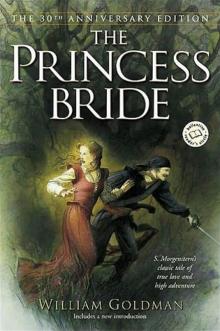 The Princess Bride
The Princess Bride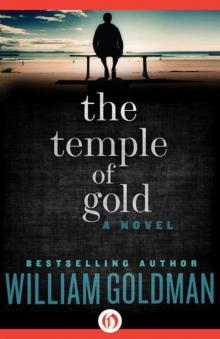 The Temple of Gold
The Temple of Gold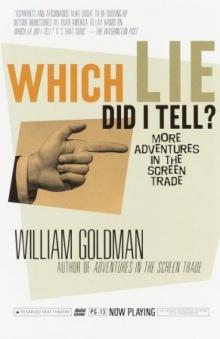 Which Lie Did I Tell?: More Adventures in the Screen Trade
Which Lie Did I Tell?: More Adventures in the Screen Trade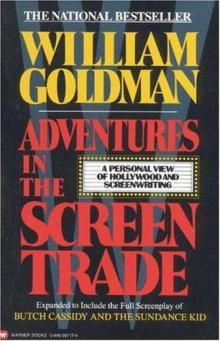 Adventures in the Screen Trade
Adventures in the Screen Trade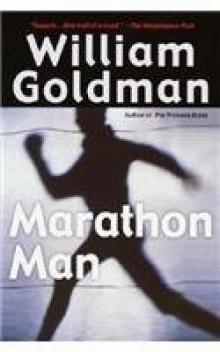 Marathon Man
Marathon Man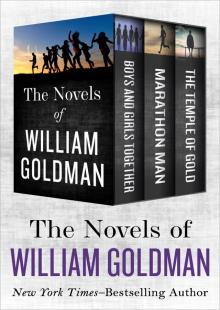 The Novels of William Goldman: Boys and Girls Together, Marathon Man, and the Temple of Gold
The Novels of William Goldman: Boys and Girls Together, Marathon Man, and the Temple of Gold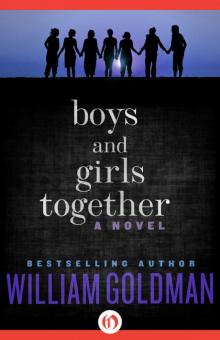 Boys and Girls Together: A Novel
Boys and Girls Together: A Novel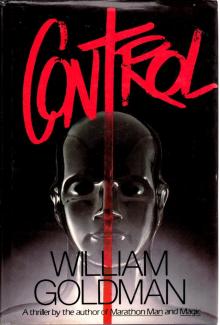 Control
Control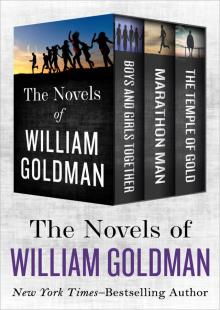 The Novels of William Goldman
The Novels of William Goldman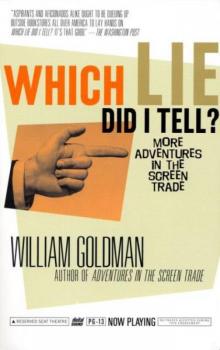 Which Lie Did I Tell?
Which Lie Did I Tell?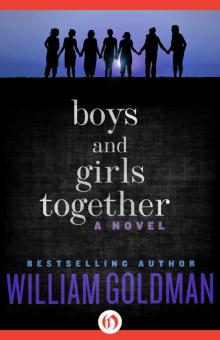 Boys & Girls Together
Boys & Girls Together